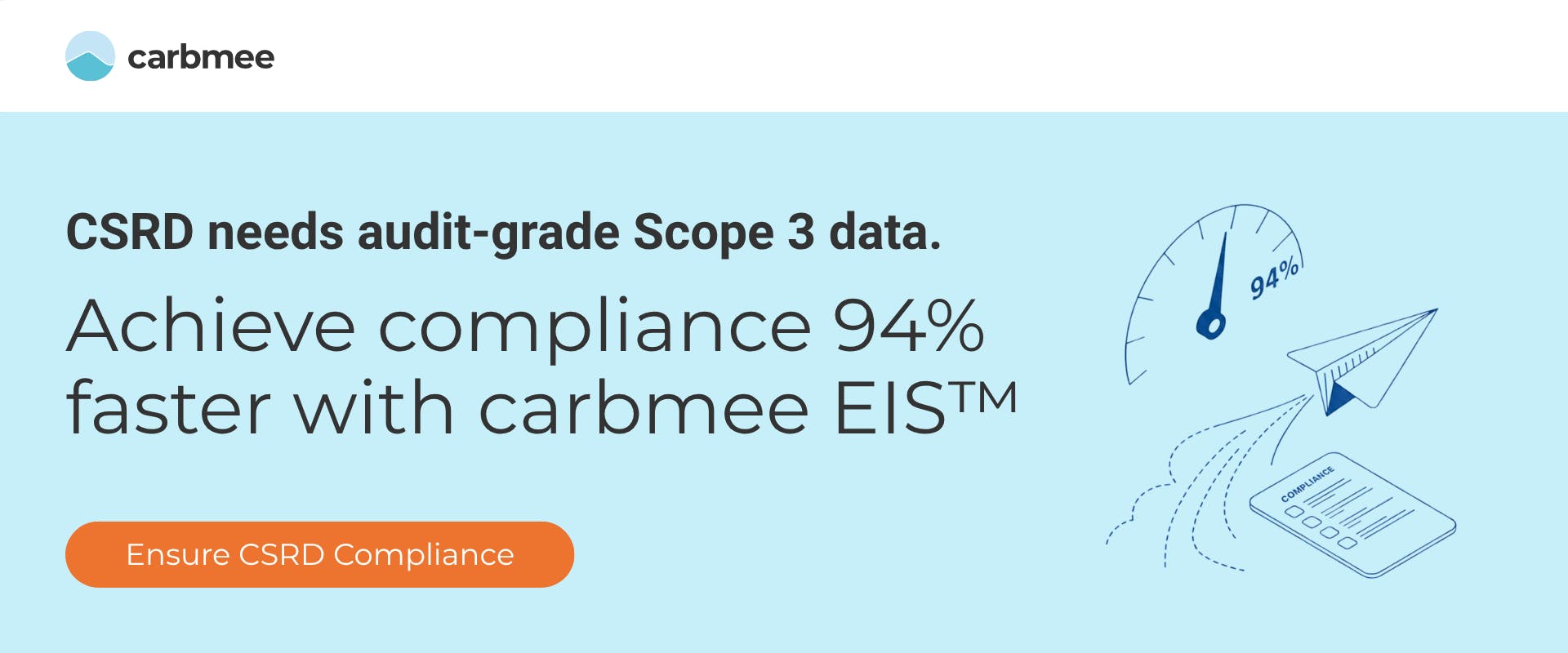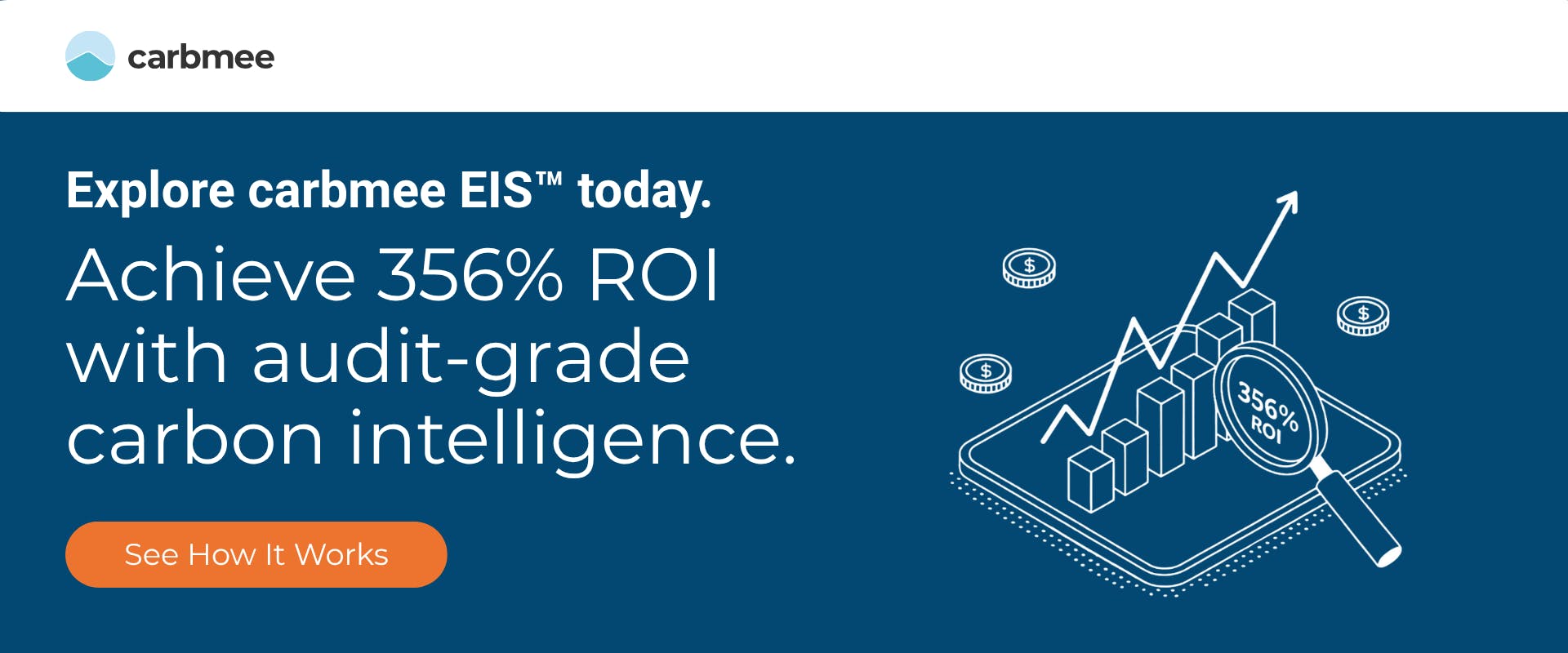The Changing Business Landscape: New Regulations and Compliance Requirements
In an era of increasing environmental regulation, businesses must face a multitude of compliance demands. The recently introduced Corporate Sustainability Reporting Directive (CSRD) brings new responsibilities for companies to reveal their environmental, social and governance (ESG) performance. This includes providing transparency on previously optional Scope 3 emissions and outlining comprehensive strategies to reduce them. Non-compliance with these regulations can lead to financial penalties and reputational harm, significantly affecting a company’s bottom line and causing shareholder tension and mistrust, ultimately also impacting top-line growth.
Moreover, the rise of carbon taxes such as the Carbon Border Adjustment Mechanism (CBAM) and modifications to the EU Emissions Trading System (ETS) present additional financial challenges. Companies importing steel, aluminum, cement, fertilizers, and energy from outside the EU will be required to report the emissions associated with those goods as early as January 2024 (referent to Q4 2023). With the first phase of compliance swiftly approaching, businesses must act promptly to assess the emissions linked to their imported goods. Failure to do so accurately can result in elevated operational costs and increased risk exposure.
Companies that do not act quickly to not only calculate the emissions of imported goods but to work with suppliers to reduce those emissions, will face increased costs, trade barriers, and market disadvantages.
As the guardians of financial resources and data, CFOs hold the key to unlocking the potential of regulatory compliance and sustainability reporting. With the spotlight on environmental performance and ESG factors growing brighter than ever, the financial well-being and enduring success of companies hinge on effective risk management and strategic decision-making.
CFOs are tasked with ensuring precise financial reporting, and the ever-changing regulatory landscape adds a new dimension of complexity to their role. Non-compliance with regulations like CSRD and CBAM not only puts companies at risk for financial penalties but also erodes investor confidence and trust. It's no secret to CFOs that shareholder value is intimately linked to a company's capacity to showcase sustainable practices, manage carbon emissions, and adapt to a fluctuating market.
By putting compliance at the top of their agenda and proactively tackling sustainability challenges, CFOs can protect their organizations' financial interests, enhance investor relations, and establish their companies as frontrunners in the race towards a sustainable future.
Seizing Opportunities: CFOs at the Forefront of Climate Action
Transitioning to a low-carbon economy not only presents challenges but also offers incredible opportunities for CFOs to establish their companies as sustainability leaders and drive long-term value. By proactively reducing carbon emissions, CFOs can not only safeguard their businesses but also secure a competitive edge in the market.
One of the standout benefits of embracing sustainability is the potential for cost savings through amplified operational efficiency. CFOs can promote initiatives to optimize energy consumption, enhance resource efficiency, and incorporate sustainable practices throughout the organization. By minimizing waste, refining processes, and adopting cutting-edge technologies, companies can decrease their operating costs while simultaneously shrinking their carbon footprint.
Moreover, integrating carbon management into a company's strategic planning process empowers CFOs to discover new revenue streams. The shift towards sustainability has fueled a growing market demand for low-carbon products and services. By investigating and adopting innovative sustainable business models, CFOs can tap into this burgeoning market segment. This might include creating and marketing green products, investing in clean technologies, or embracing circular economy practices that prioritize resource recycling and reutilization. Such endeavors not only resonate with environmentally conscious consumers but also offer the potential to attract new clients and boost brand reputation.
Additionally, CFOs can utilize sustainable financing practices to unlock even more opportunities. The surge of green finance and sustainable investment has paved the way for companies to access capital specifically designated for green initiatives. By aligning their financial strategies with sustainability objectives, CFOs can captivate investors who prioritize ESG factors and are eager to support companies demonstrating a commitment to climate action. This can lead to improved access to capital, favorable lending terms, and enhanced investor relations.
By actively engaging in carbon management and capitalizing on market opportunities, CFOs can position their companies at the vanguard of climate action. This strategic approach not only aligns with global sustainability goals but also equips businesses to flourish in an evolving market landscape. CFOs who adopt sustainability as a core business strategy can drive innovation, cultivate resilience, and generate long-term value for their organizations while contributing to the global transition to a low-carbon economy.
The CFO's Essential Role in Driving Sustainable Business
The CFO is uniquely positioned to drive sustainability initiatives within an organization. As the custodian of financial data, the CFO has a holistic view of the company's operations and understands the financial implications of sustainability-related decisions. They have the expertise to analyze the costs and benefits of sustainable investments and communicate the business case to stakeholders.
In addition, CFOs have the authority to allocate resources and influence strategic decisions. By integrating sustainability into financial planning, budgeting, and performance evaluation processes, CFOs can ensure that sustainability becomes a core component of the company's strategy and operations. Their involvement sends a powerful message to internal and external stakeholders, demonstrating a commitment to long-term value creation and responsible business practices.
The Power of EIS: Enabling CFOs to Drive Sustainability
Discover carbmee EIS™ – the game-changing software designed to provide CFOs with the essential tools required to tackle sustainability issues and steer their organizations towards net-zero.
As sustainability reporting becomes more crucial than ever, EIS offers CFOs powerful capabilities to effectively gauge and control carbon performance. By automating the collection, analysis, and reporting of carbon emissions data, EIS empowers CFOs to monitor carbon emissions, evaluate environmental risks, and keep tabs on progress towards climate objectives.
One standout feature of EIS is its exhaustive reporting capabilities, ensuring adherence to industry standards such as the Greenhouse Gas Protocol (GHG Protocol), the Global Reporting Initiative (GRI) standard, and the Science-Based Targets Initiative (SBTi). By complying with these pertinent standards, CFOs can report carbon emissions accurately and transparently, fostering stakeholder trust and showcasing their commitment to environmental responsibility.
But that's not all – EIS surpasses mere compliance, enabling CFOs to proactively pinpoint risks and opportunities. To stay ahead in the face of evolving regulations and investor expectations, CFOs can rely on EIS to assess potential business risks linked to upcoming regulations like the Carbon Border Adjustment Mechanism (CBAM) and adjust their strategies accordingly. Simultaneously, it helps them discover opportunities within the burgeoning green economy, positioning their organizations as sustainability frontrunners and driving revenue growth.
EIS presents a comprehensive solution that encourages collaboration and simplifies processes. It allows cross-functional teams to work in harmony and streamlines the efficient gathering and management of sustainability data. By consolidating information and delivering real-time insights, EIS enhances decision-making, empowering CFOs to make informed choices that reduce carbon emissions and optimize resource allocation.
With EIS at their disposal, CFOs can secure a competitive edge in the marketplace. They can confidently report on their company's carbon emissions, showcase compliance, and pinpoint areas for improvement. By harnessing the robust analysis and reporting capabilities of EIS, CFOs can spearhead meaningful change, position their organizations as sustainability trailblazers, and tap into new business opportunities within the rapidly evolving green economy.
Embracing Climate Leadership
To sum it up, the Chief Financial Officer's (CFO) role has transformed from merely overseeing traditional financial management to spearheading sustainability leadership. With the pressing need to tackle climate change, adhere to regulations, and satisfy investor expectations, companies must now incorporate sustainability into their core strategies and operations. CFOs possess a golden opportunity to steer this shift and establish their organizations as frontrunners in transitioning to a net-zero future.
By staying ahead of the curve and comprehending the risks tied to compliance requirements, such as the CSRD and carbon taxes like the CBAM, CFOs can proactively ready their companies, minimize financial and operational risks, and dodge expensive penalties. Mastering the art of navigating complex regulatory landscapes and implementing sustainable practices can safeguard an organization's financial well-being and reputation.
Moreover, the pivot towards sustainability presents a treasure trove of value creation possibilities for CFOs. By pinpointing opportunities to slash carbon emissions, enhance operational efficiency, and tap into new revenue streams in the green economy, CFOs can fuel long-term profitability and resilience. Beyond aligning with stakeholder expectations, sustainability initiatives can boost investor confidence, magnetize capital, and polish a company's standing in the marketplace.
While sustainability demands a group effort, the CFO holds the reins in steering change. Armed with financial expertise, cross-functional influence, and access to data, CFOs can effectively convey the business case for sustainability, obtain resources, and rally teams across the organization. As strategic visionaries, transformative catalysts, collaborative integrators, and relatable communicators, CFOs can guide their companies towards sustainable practices that benefit the environment, society, and shareholders alike.
To support CFOs on their sustainability quest, cutting-edge software solutions like the Environmental Intelligence System (EIS) provide a comprehensive approach. With EIS at their fingertips, CFOs can report on carbon emissions following relevant standards; identify business risks and opportunities aligned with upcoming regulations and investor expectations; and cultivate collaboration among team members. By harnessing the power of technology, CFOs can streamline processes, ramp up efficiency, and trim costs while effectively managing their organization's sustainability performance.
CFOs hold the key to unlocking a net-zero future. By championing sustainability, mitigating risks, and seizing opportunities, CFOs can navigate their organizations towards long-term success, resilience, and positive environmental impact. Equipped with the right tools and a steadfast commitment to sustainable practices, CFOs can drive the future of their companies and contribute to a more sustainable economy.
![[object Object]](https://images.prismic.io/carbmee/aMvtxGGNHVfTPXE5_carbmee_image_reupload_16.jpg?auto=format,compress)






